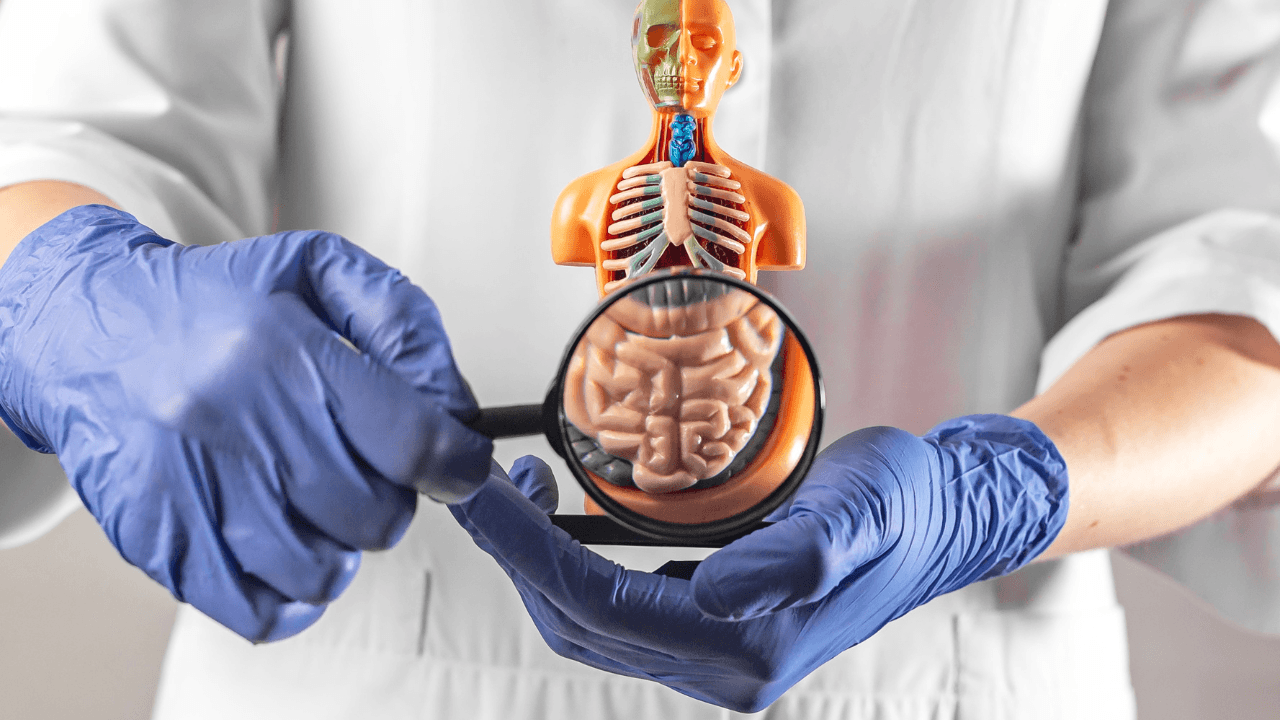The Impact of SIBO on Gut Disorders
by Vanita Dahia
SIBO stands for small intestinal bacterial overgrowth. It is a condition in which there is an abnormally large number of bacteria in the small intestine. The small intestine is normally home to a small number of bacteria, but in people with SIBO, the number of bacteria can be 100 times greater than normal.
Small Intestinal Bacterial Overgrowth (SIBO) is a condition of increased number of bacteria present in the small intestine.
SIBO is a subset of irritable bowel syndrome (IBS). SIBO affects between 10% and 15% of the population globally. It is estimated that over 50% of patients diagnosed with IBS actually have SIBO.
SIBO is caused by an overgrowth of various types of bacteria that should normally be found in the colon. The study of SIBO has been extended to SIFO, Small intestinal fungal overgrowth.
What causes SIBO?
The exact cause of SIBO is not fully understood, but it is thought to be due to a combination of factors, including:
- Changes in the motility of the small intestine: The small intestine normally moves food through at a steady pace. However, if the motility of the small intestine is slow, it can allow bacteria to grow and multiply.
- Changes in the immune system: The immune system normally helps to keep the number of bacteria in the small intestine under control. However, if the immune system is not working properly, it can allow bacteria to grow and multiply.
- Structural problems in the small intestine: Structural problems in the small intestine, such as a stricture or a fistula, can also increase the risk of SIBO.
What does it feel like to have SIBO?
- Diarrhea: This is the most common symptom of SIBO. The diarrhea can be watery, loose, or fatty.
- Abdominal pain: This is another common symptom of SIBO. The pain is often located in the upper abdomen and can be cramping or dull.
- Gas: People with SIBO often have excessive gas. The gas can be accompanied by bloating and belching.
- Weight loss: People with SIBO may lose weight, even if they are eating a normal diet.
- Malabsorption: This is a condition in which the body is unable to absorb nutrients from food. People with SIBO may have difficulty absorbing fat, vitamins, and minerals.
Underlying factors associated with SIBO
SIBO can lead to dysfunction in many organ systems:
- Gastrointestinal function – poor digestive capacity, low bile levels which are used for emulsifying fats
- Motility disorders – impaired gastric peristalsis and migrating Motor complex, the natural muscle movement in the colon
- Structural imbalances – complications of gastrointestinal tract due to surgical procedures or endometriosis
- Immune dysfunction – imbalance of commensal microbes and intestinal immunoglobulins
Management of SIBO
Management of SIBO involves correction of the diet. Initiate a SIB biphasic diet whilst treating the system. Treatment strategies involve a step by step approach:
- Eradicate bacterial overgrowth – eradicate hydrogenic bacteria with herbs that have antioxidant, anti-infective and anti-inflammatory activity.
- Support digestion and immune function
- Support healthy balance of normal bacteria in the intestine with a structured probiotic
- Address underlying factors
Here are the steps to manage SIBO
Step 1
Antimicrobial agents – Barbary, Oregon grape, berberine, garlic, Black Walnut, olive leaf, caprylic acid
Step 2
Support healthy microbial balance, eradicate hydrogenic bacteria with oregano, Ginger, turmeric, olive leaf, neem
Support digestion and absorption with pancreatic enzymes, brush border enzymes to aid protein carbohydrate and fat breakdown and absorption
Stimulate liver and bile flow. Bile plays a major function in emulsifying and solubilising fats. Detoxify the liver and support bile flow with ox bile, pancreatic, pepsin and liver detox herbs
Step 3
Biofilm disruption – Biofilm forming bacteria adhere to surfaces of gastrointestinal mucosa in aqueous environments. Biofilms of mucus layers that line the digestive tract perform important functions to moisten, lubricate and reduce inflammation within the walls of the colon. In an unhealthy colon, biofilms can promote inflammation which is aimed to protect from microbial infestations. Biofilms are held together by a protective polysaccharide matrix which protects the bacteria from oxidative damage caused by antimicrobial agents. This is one of the mechanisms by which anti-bacterial agents or antibiotics become resistant.
N-acetylcysteine and proteolytic enzymes such as Steptokinase and lumbrokinase inhibit biofilm formation, destroying development of biofilm and aid restoration of normal gastric barrier.
Step 4
Stimulate gastric motility- GI motility is defined as the movements of the muscles of the digestive organs, which include the esophagus, stomach, small and large intestines. GI motility allows the content of the digestive tract to move through each stage of digestion. The migrating Motor complex (MMC) is a cleansing way of muscle function within the colon stimulating peristalsis with prokinetic agents to restore motility in the gastrointestinal tract.
‘Prokinetic agents means ‘pro’ means to promote or give rise to something, whereas ‘kinetics’ means movement or activation of the GI tract.
Prokinetic agents may include pharmaceuticals such as Domperidone or natural agents such as Ayurvedic Triphala, ginger, vitamin B6, acetyl l-carnitine or tryptophan.
Step 5
Enhance gut integrity and reduce inflammation with fermented foods such as sauerkraut, kimchi or cabbage which is high in glutamine. Support intestinal health with glutamine, curcumin, Boswellia (herb), aloe vera, noni juice.
Step 6
Restore gut microbiome with multi strain probiotics or soil based pH resistant probiotics. Multistrain probiotics may be used. Probiotics useful in SIBI include:
- Saccharomyces boulardii.
- Bifidobacterium infantis – shown to reduce abdominal pain, bloating, and bowel movement
- Bifidus lactis
- Lactobacillus plantarum
- Bacillus Indicus
Diets for SIBO
This is based on the therapeutic low FODMAP (Fermentable Oligosaccharides, Disaccharides, Monosaccharides and Polyols) and SCD (Specific Carbohydrate Diet). It is designed to help eliminate bacterial overgrowth from the small intestine.
Chronic SIBO sufferers often find that they can be prone to food ‘reactions’. The most common are from histamine, oxalates and salicylates which are substances in foods that are normally tolerated but can cause problems when the digestive tract is inflamed and reactive. Healing the small intestines can lead to a resolution of these reactions.
Fermented foods such as sauerkraut, kimchi, miso and yoghurt are great for the digestive tract as they contain high amounts of probiotics or beneficial bacteria. However, many people can react to the histamines in these foods.
Histamine is a biogenic amine which is naturally high in certain foods. Symptoms of histamine intolerance include headaches, bloating, cramping, insomnia, itching, allergies. Histamine is found in spinach, aged meats, bone broth which has been cooked for hours, tinned fish or meats.
Oxalates are naturally found in green leafy vegetables and other plant-based foods. They can cause gut reactions by irritating the mucosal lining. Symptoms include joint pain, kidney stones. High oxalate foods are almonds, spinach, silverbeet, rhubarb, quinoa, cacao.
Salicylates are natural plant substances which help the plant defend itself against bacteria, fungi and other pests. Those with a salicylate sensitivity have a much lower threshold before symptoms occur such as itching, stomach pain, headaches, puffy or burning eyes, sinus congestion. Foods high in salicylates include tomato, eggplant, capsicum, radish, zucchini, berries, avocado, coconut and olive oil.
The SIBO diet is a gradual elimination diet that is meant to reduce inflammation in the digestive tract and bacterial overgrowth in the small intestine. In some cases, eliminating only sugars can ease symptoms.
There are 4 phases in diet manipulation in the treatment of SIBO
- Reduce – Starve the bacteria
- Repair – repair inflammation in the gut
- Remove – microbial infestation
- Restore gut mucosal function and normal motility of the gut with prokinetic agents
Incorporate a diet low in FODMAPs, which are difficult-to-digest carbs that are fermented by gut bacteria in the colon. When carbs can’t break down, they accumulate in the gut and can cause symptoms such as diarrhoea and bloating. In addition, if there is bacterial overgrowth, the small intestine bacteria begin to ferment the carbs too early, causing many symptoms.
The low-FODMAP diet has been clinically proven to treat irritable bowel syndrome (IBS) and SIBO.
Low FODMAPs diet is aimed at limiting or removing:
- fructose, simple sugars commonly found in fruits and some vegetables, honey, and agave nectar
- lactose, a sugar molecule in dairy products
- fructans, a sugar compound found in gluten products, fruits, some vegetables, and prebiotics
- galactans, a compound found in some legumes
- polyols, a sugar alcohol often used as a sweetener
The Specific Carbohydrate Diet (SCD) is a very restrictive, unconventional diet plan that severely limits most carbs. It is based on the theory that by eliminating most carbs (primarily grains, starches, dairy, and sugars) and allowing only specific carbs that require minimal digestion, it can reduce inflammation and make eating enjoyable for people with gastrointestinal (GI) disorders.
Educational Webinar
The Impact of SIBO on Gut Disorders
In this webinar, you will learn:
✔ Is it SIBO or IBS?
✔ How did SIBO get there?
✔ SIBO Diagnosis
✔ SIBO diet or low FODMAP Diet
✔ Management of SIBO
How to Identify SIBO
SIBO breath test identifies hydrogen and methane gases that are released by bacteria found in the small intestine. After consuming the prescribed sugar in the test kit, breath is expelled and collected at specific time slots indicative of hydrogen and methane readings within the small intestine ( up to 2 hrs from consuming sugar) and large intestine (between 2 and 3 hrs).
The result will report on levels of hydrogen and methane from the breath. Bacteria in the small intestine consume the sugar to release these gases.
Hydrogen gas is representative of hydrogenic bacteria present in predominantly in the proximal part of the small intestine. The presence of hydrogenic bacteria are associated with diarrhoea.
Elevations in methane levels are reflective of the presentence of methanogenic bacteria, typically associated with constipation and biliary dyskinesia.
SIBO can be diagnosed with a breath test. In this test, you drink a sugar solution and then blow into a tube. The levels of hydrogen and methane in your breath are measured. If the levels are high, it suggests that you have SIBO.






